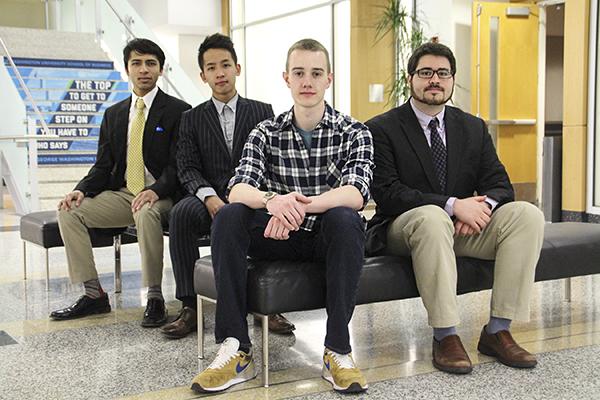Updated: March 7, 2016 at 8:38 a.m.
A team of economics students proved they know how to handle a crisis.
Four undergraduate students won first place in the National Association of Business Economic Crisis Game competition at Brandeis University last month. This is the second year that a GW team has participated, and the first time they took home the champion title.
GW’s team was the only team of undergraduates in the competition.
The competition gives teams four hours to formulate and present a solution to the economic crisis of an imaginary country based on data and information they receive about the country’s geography, demographics and economy. The international school of business at Brandeis University first launched the game four years ago.
The four-member team spent time researching economic crises throughout history to see how organizations like the International Monetary Fund and the World Bank have handled them in the past. As first place winners, the team members were guaranteed interviews for an internship with Information Handling Services, a consulting firm. A GW team of Ph.D. students came in second place in the competition last year.
David Benowitz, a senior, said that the prestige of the officials and the competitors made the win especially gratifying.
“It was more exciting, I’d say. We got to see the talent that was there, and it was pretty interesting, especially when we got in the room just reading the names of who the judges were, and their titles and their positions,” Benowitz said.
The game is a chance for participants to show off their skills to high-profile judges, who come from the IMF, the Federal Reserve, IHS and other economic consulting companies. Brandeis is currently planning to expand the competition to a national level.
Sam Mackey, a senior, said the students’ economics courses helped them prepare for the game.
“The econ professors in the department here focus a lot of their teaching around case studies, real world examples,” Mackey said, adding that the team used “the general problem-solving skills” they had learned at GW.
Olga Bespalova, a doctoral candidate in economics and teaching assistant, said she helped the team prepare for their competition against other teams from Brandeis, New York and Columbia universities. Bespalova was the leader of last year’s team of Ph.D. students at the competition.
“This game is a very good simulation of what people, business and government officials experience when they have to solve a problem in a very short time,” she said.
Anthony Yezer, an economics professor, reached out to the team after hearing of their win, in hopes they will represent the University in an upcoming policy case competition hosted by Columbia University.
Yezer said the win did not come as a surprise because the work he and his colleagues assign in their economics courses trains students for the kind of problem-solving used in the competition.
“I expect our students to win. We train the students properly,” Yezer said. “If you talk to some of our seniors who have gone through the case study part of their job interviews, and you ask them what the case studies were like, they’ll tell you it was like the problem sets that they got in our classes.”







